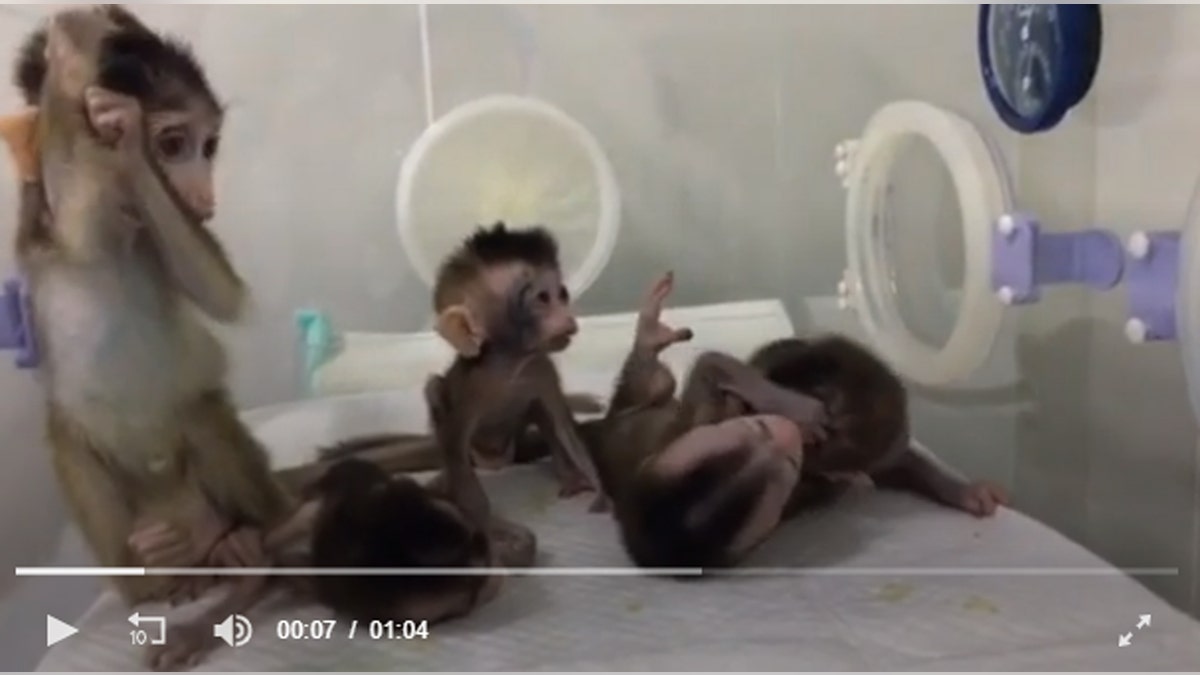
A screen grab of the five cloned monkey. (Credit: Science China Press)
China’s latest monkey cloning experiment has sparked outrage and been labeled “monstrous” by animals welfare advocates.
Researchers at the Chinese Academy of Sciences Institute of Neuroscience have cloned five monkey babies from a single donor with genes edited to cause diseases.
The Chinese scientists tinkered with a specific gene in the original donor monkey to produce the unhealthy animals which they say will help medical research.
The gene is BMAL1, which helps regulate the circadian rhythm but scientists made it inoperative using a gene-editing tool, known as CRISPR. With the gene turned off, the animals are at greater risk of developing sleeping problems, hormonal disorders and a host of diseases.
Researchers said the monkeys demonstrated increased anxiety and depression, reduced sleep time, and even “schizophrenia-like behaviors,” according to a pair of papers published by the scientists in the National Science Review.
All five macaques were born with identical genes, which include the mutation.
“Disorder of circadian rhythm could lead to many human diseases, including sleep disorders, diabetic mellitus, cancer, and neurodegenerative diseases, our BMAL1-knock out monkeys thus could be used to study the disease pathogenesis as well as therapeutic treatments” said Hung-Chun Chang, senior author and investigator of the Chinese Academy of Sciences Institute of Neuroscience in a statement.
Researchers used a cloning technique known as somatic cell nuclear transfer to produce the five macaques, the same method they used to generate the first two cloned monkeys this time last year.
It is also the same general method used to clone Dolly the sheep more than two decades ago.
The experiment to clone the two healthy monkeys, reported in the journal Cell in January last year, also caused some apprehension among the broader scientific community.
“The genie’s out of the bottle now,” said Jose Cibelli at the time, a cloning expert at Michigan State University in the US.
Animals rights advocated have slammed the latest experiment. Dr. Julia Baines, Science Policy Adviser at PETA UK, said: “Genetically manipulating and then cloning animals is a monstrous practice that causes animals to suffer.”
But speaking to news.com.au in June, Director of the Chinese Academy of Sciences Institute of Neuroscience and co-author of the latest papers, Dr Mu-ming Poo, defended the practice of using cloned animals for medical research.
“More cloned monkeys will soon be produced,” he said at the time. “Some of them will carry gene mutations known to cause human brain disorders, in order to generate useful monkey models for drug development and treatment.”
It’s important to note that because primates share approximately 95 percent of human genes and a number of physiological and anatomical similarities, biomedical research currently uses a large number of monkeys, sometimes up to 100,000 annually around the globe.
“This number will be greatly reduced by the use of monkeys with uniform genetic background that reduces the noise in experimental studies,” Dr. Poo said, pointing to the example of testing drug efficacy before clinical trials.
“This will greatly help the ethical use of non-human primates for biomedical purposes.”
The team behind the latest experiment reiterated that position in the statement this week, saying the institute is following strict international guidelines for animal research.
The gene-edited monkey clones come hot on the heels of a rogue Chinese scientist announcing he used CRISPR technology to create the world’s first gene-edited human babies.
The controversial doctor made headlines last November after claiming he altered human embryos resulting in the birth of genetically edited twin girls.
This story originally appeared in news.com.au.








































